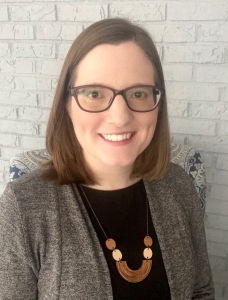Meet Mindfulness & IFS Guru Ashley Vaden, LMFT
Reassessing midlife for more fulfillment.
In Season 2, Episode 3 (Part 1) Megan discusses the common experience of feeling stuck or unfulfilled in her midlife journey. She acknowledges the feeling of being a hamster on a hamster wheel, going through the motions without making progress or finding joy. This sentiment resonates with many individuals who reach a point in their lives where they question if they have accomplished all they set out to do and if there is more to life.
Midlife is a natural time for reflection and reassessment. It is a period where individuals evaluate what is working for them and what is not. This introspection is normal and can lead to personal growth and positive change. Megan encourages listeners to reclaim their time, energy, and joy in order to make the most of the second half of their lives.
Ashley Vaden, shares her personal experience and perspective. She talks about growing up in Frankfurt, Kentucky, and the culture shock she experienced when moving to Shelby County. Despite the challenges, she used this time to focus on her studies and develop a love for learning. Ashley expresses her desire to be a lifelong student and emphasizes the importance of continuous growth and curiosity.
Ashley’s journey led her to study psychology in college, driven by her own positive experience with therapy in high school. This decision reflects her desire to understand human behavior and help others. Megan commends Ashley for her work as an office therapist at the Mindfulness Center and highlights her contributions to mindfulness classes.
There is great significance in reassessing midlife for more fulfillment. It encourages individuals to take stock of their lives, identify areas that need improvement, and seek out new experiences that bring joy and peace. By acknowledging the need for change and actively pursuing personal growth, individuals can find greater fulfillment and happiness in the second half of their lives.
Reassessing midlife is not about regret or feeling like time has been wasted. Instead, it is an opportunity to realign priorities, set new goals, and make conscious choices that align with one’s values and passions. It is about finding the courage to make changes and explore new possibilities.
This is a reminder that it is never too late to reassess and make positive changes. Megan encourages listeners to embrace the second half of their lives with a sense of adventure, curiosity, and a commitment to personal growth.
Flexibility and freedom in therapy.
Flexibility and freedom in therapy are crucial aspects that can greatly impact both the therapist and the client.
Flexibility allows therapists to adapt their approach and techniques to meet the unique needs of each client. Ashley had initially considered pursuing a career in fashion or moving to New York. However, due to financial responsibilities and student loans, she decided to utilize her psychology degree and work as a therapist. This decision demonstrates the flexibility she had to make in order to support her son and pay off her debts. By being open to different possibilities and adapting to the circumstances, she was able to find a job that aligned with her skills and interests.
Furthermore, flexibility in therapy allows therapists to be responsive to the changing needs and goals of their clients. Ashley initially did not want to work with children but found herself working with them in her first job. However, she discovered a love for working with kids and found it to be a profound and life-changing experience. This demonstrates how being open to new experiences and adapting to different client populations can lead to unexpected growth and fulfillment in therapy.
In addition to flexibility, freedom in therapy is also crucial.She mentioned that she decided to transition to a different job after five years of working in a high-intensity setting. She desired more flexibility and freedom to be with her child. This highlights the importance of work-life balance and the need for therapists to prioritize their own well-being and personal lives. By seeking out a job that provides more flexibility, therapists can create a healthier and more fulfilling work environment for themselves.
Freedom in therapy allows clients to feel empowered and in control of their own healing journey. Ashley mentioned how she appreciated having someone tell her what to do when she was feeling burnt out in grad school. By providing clients with the freedom to make choices and take ownership of their healing process, therapists can empower them to overcome challenges and achieve their goals.
Internal Family Systems empowers change.
Internal Family Systems (IFS) is a therapeutic modality that empowers individuals to create change from within. It recognizes that within each person, there are multiple parts that make up their internal system. These parts can be seen as different aspects of the individual’s personality, each with its own unique characteristics and motivations. The goal of IFS is to help individuals understand and connect with these parts, and ultimately, to find harmony and balance within themselves.
In this episode, Megan talks about the transformative power of IFS in the lives of both therapists and clients. Ashley shares her experience of transitioning from working in an agency to starting her own private practice. Initially, she felt afraid and uncertain about this change, but when she shared her decision with her boss, he expressed his support and decided to join her in this new venture. This moment of validation and support brought a sense of relief and confirmation that she was on the right path. It highlights how IFS can provide individuals with the courage and confidence to make significant life changes.
Internal Family Systems empowers change by providing individuals with the tools and understanding to explore and connect with their internal selves It encourages flexibility, adaptability, and self-compassion, allowing individuals to make meaningful changes in their lives.
If you are interested in learning more about Internal Family Systems and therapy, make sure to check out this interview with Ashley on the shift your shit podcast!


 . She wants you to know that hope is always available to you, however dismal life may seem. My clients describe me as authentic, down-to-earth, non-judgmental, and real.
. She wants you to know that hope is always available to you, however dismal life may seem. My clients describe me as authentic, down-to-earth, non-judgmental, and real.




 As a therapist, I specialize in helping people flourish, whether that means leaving a toxic relationship of some sort or working to improve a relationship in their life that’s worth it. I work with individuals who aren’t sure what they want and help them determine what’s
As a therapist, I specialize in helping people flourish, whether that means leaving a toxic relationship of some sort or working to improve a relationship in their life that’s worth it. I work with individuals who aren’t sure what they want and help them determine what’s 

